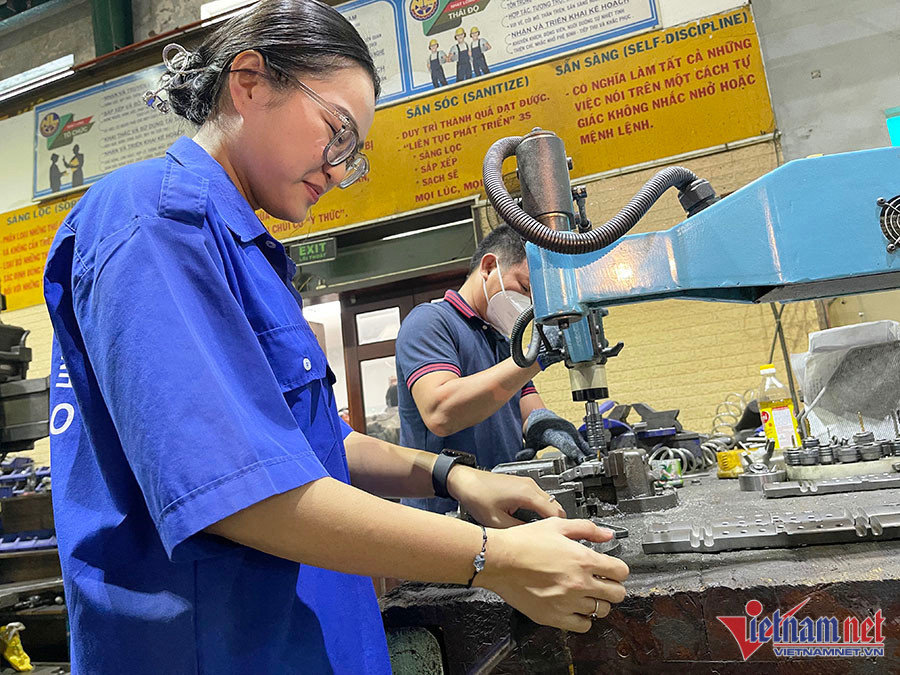Vietnam supporting industries fear they may lose in home market
Enterprises in supporting industries now have great opportunities to develop but they will not grasp the opportunities if they can’t get support from the state.
Nguyen Van Tri, CEO of Lap Phuc Co Ltd, which specializes in making hi-tech prototypes for export to the US, said the company enjoyed benefits from the HCM City’s demand stimulus package, which allowed it to import more modern equipment and expand its factory.
According to Tri, when placing orders, US enterprises always require that Vietnamese products must be ‘cheaper than Chinese’. In other words, in order to obtain market shares, Vietnamese products need to be cheap.
“In order to make products at lower production costs, the company has to buy used machines from Japan and then upgrade them. Used machines are taxed very high. If companies can manufacture machine bodies but still have to import components, they won’t be able to compete with Taiwanese products,” he said.
“Only when the tax problems can be solved will the domestic machine manufacturing develop, so Vietnamese enterprises will have cheap machines for production,” he added.
He went on to say that small-scale enterprises in supporting industries are at a big disadvantage. The biggest problem is the labor drain. Many workers are trained at small enterprises and then leave for bigger enterprises and foreign invested enterprises (FIEs) when they become skilled.
Production enterprises have two sources of capital, including money and equipment; and workforce. Human resources in the mechanical engineering sector are seriously lacking.
Regarding taxation policies, Ho Quynh Hung, Chairman of Dien Quang Lamp JSC, said most electronic products are not taxed, or just bear very low taxes, while some electronic components used during the process of creating finished products have to bear taxes. As such, the current taxation scheme doesn’t encourage enterprises to start manufacturing electronic components.
Dien Quang is cooperating with its partners to manufacture Vietnamese branded tablets. Electronic boards are taxed zero percent. Meanwhile, accessories to make the electronic boards are taxed differently: some are not taxed, while some others bear tax, with the average tax rate of 3 percent.
As such, the paradox is that if manufacturing products in Vietnam, enterprises would be taxed 3 percent, but if importing products for sale, they won’t have to pay tax.
Tax policies
Do Phuoc Tong, chair of Duy Khanh Mechanical Engineering, said enterprises have been complaining about the problems in tax policies for the last 20 years, but nothing has changed since then.
Article 10 of the 2016 Law on Import and Export Duties stipulates the principle of taxation is that the import tax rates gradually decrease from finished products to raw materials.
Therefore, enterprises cannot understand why import finished products are taxed zero percent, while import components have to bear taxes.
What to do to help small and medium enterprises (SMEs) join the global supply chain? Tong said at first enterprises need to join the chain. If the policies are good, they could serve as a platform for enterprises to make more investments and improve their capability.
“The HCM City Society of Mechanical Engineering and Electrical Enterprises is running the Made By Vietnam Program. We want to have products made by Vietnamese enterprises with Vietnamese capability but we need a policy,” he said.
Tong said HCM City had previously launched demand stimulus packages and enterprises enjoyed benefits from the packages, thanks to which they have made investments and scaled up production scale.
The last two years was the period when enterprises needed to make heavy investment to develop, but because of legal reasons, the policy was suspended. Enterprises hope the policy will be reactivated this year.
Bui Ta Hoang Vu, director of the HCM City Department of Industry and Trade, said after a period of international integration, it is time to reconsider supporting industries. If not, domestic enterprises will still do outsourcing and get small added value in the production chain.
HCM City is doing programming to position the industrial production of the city. The questions about land scale, human resources preparation and organization in regional links will find the answers.
Vu said if a resolution to replace Resolution 54 gets approval, HCM City will be given more powers to solve existing problems. HCM City will need to encourage the development of many investment fields and one of them is supporting industries.
Regarding the demand stimulus package, Vu said the city would restart the program as soon as possible.
Tran Thuy
Source: https://vietnamnet.vn/en/supporting-industries-fear-they-may-lose-in-home-market-2123692.html


 English
English




